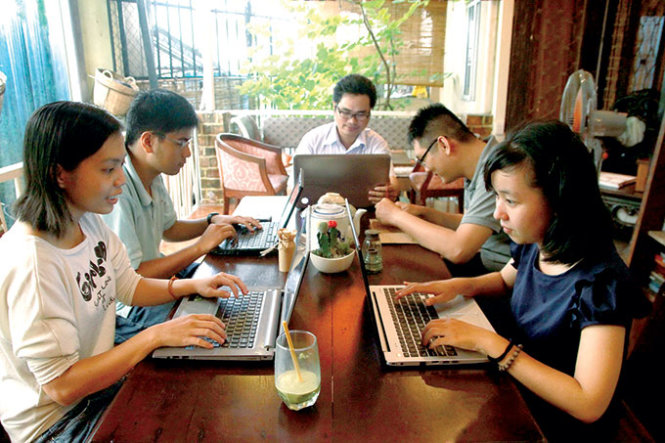Overseas Vietnamese alumni and students have launched a program to mobilize expert assistance in career orientation and other areas and offer it to their peers at home.
>> An audio version of the story is available here
The “Pro Bono Program” was jointly introduced in early January by the Association of Vietnamese Students and Professionals in the United States (AVSPUS), the Vietnam-U.S. Alumni Club in Hanoi, and the U.S. Alumni Club in Ho Chi Minh City.
The program is set to officially kick off online next month.
The Latin term “pro bono” means done or undertaken for the public good without any payment or compensation, according to Encarta Dictionary.
Meanwhile, the Merriam Webster Dictionary indicates that the term was first used in 1970 for professional work which is undertaken voluntarily and without payment or at a reduced fee as a public service.
In its early phase, “pro bono” activities were mostly limited to the legal profession, but are now increasingly seen in architecture, marketing, medicine, technology, and strategy consulting firms.
Unlike conventional volunteer work, Pro Bono service coordinators make use of professionals’ specific skills to provide services to those in need who are unable to afford them in a certain amount of time.
Pro Bono services have thrived in such countries as the U.S., U.K., South Korea, and Japan in recent years.
The “Pro Bono Program” recently launched by the Vietnamese alumni in the U.S. will offer assistance, counseling, and information on a wide array of areas which the assistance providers are involved in, according to sinhvienusa.org, which is the website of AVSPUS.
For instance, a lawyer who participates in the program is willing to give the recipient free guidance on legal procedures regarding how to open a company.
Meanwhile, an English teacher can offer the recipient tips on how to make progress in their English studies.
The program coordinators’ job is to connect the assistance providers and those in need of help, and make sure the process goes on seamlessly, sinhvienusa.org added.
The coordinators will also receive feedback from both sides to improve their performance.
Those interested can find out more about or register for the program at www.sinhvienusa.org or via email at viet.youth.empowerment@sinhvienusa.org.
Giving back to the community
“Such pro bono activities are integral to community growth. I know many overseas Vietnamese students who yearn to share what they’ve gained with their peers at home and contribute to their country’s development. I’m thus positive about the feasibility of these activities in Vietnam,” said Dr. Huynh The Du, a lecturer of the Fulbright Economics Teaching Program in Ho Chi Minh City who is one of the Pro Bono Program’s founders.
He added one of his team’s long-term goals is making possible a function which allows assistance providers to build their own images right in the program.
They will also strive to design their program so that one assistance provider can offer counseling to 100 or even 1,000 assistance seekers at the same time, in the same way online classes operate, Dr. Du noted.
Most of the youths interviewed by Tuoi Tre (Youth) newspaper gave positive feedback on the “Pro Bono Program.”
“The program is my long-awaited dream. I myself experienced a lack of career orientation and bewilderment during my university years, so I’m convinced that the program will serve as ‘therapy’ which many young people crave and will certainly benefit hugely from,” remarked Huynh Tuan Anh, a specialist at Phuc Tin Co., a Vietnamese firm.
Mai Quyet Thang, content strategy manager at Awareness I.d., an independent public relations firm in Vietnam which has won regional recognition, found the program an innovative model in mobilizing and tapping into the intellectual community’s “grey matter resources” and giving it back to the community.
“The point that counts is how to make the services readily accessible to those actually in need, and avoid the fact that a number of people take advantage of the program for their unrighteous benefits,” Thang pointed out.
Meanwhile, Nguyen Thanh Tung, a financial counselor with PNT International Auditing Co., a local company, underlined the boundless knowledge and opportunities that the program will bring to those who are eager to learn but are not financially empowered.
“However, I think the program will encounter certain hurdles. For instance, as for financial counseling, we generally need a long time to monitor and analyze the situation before coming up with sound advice,” he noted.
Despite all the obstacles ahead, Tung affirmed his willingness to provide free counseling and introduce more people to the program.
Like us on Facebook or follow us on Twitter to get the latest news about Vietnam!


















































